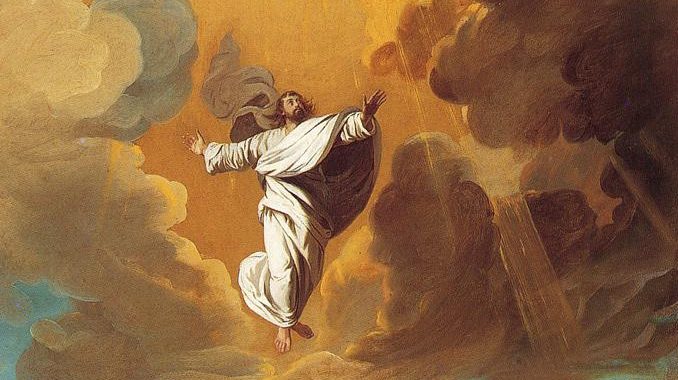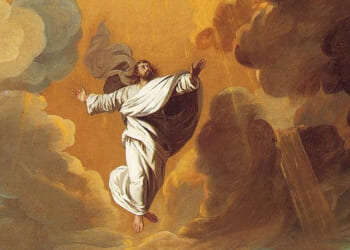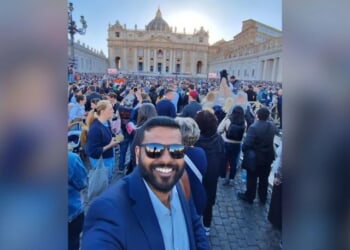
Readings:
• Acts 1:1-11
• Psa. 47:2-3, 6-7, 8-9
• Eph. 1:17-23 or Heb. 9:24-28; 10:19-23
• Lk 24:46-53
“He ascended into heaven, and sits at the right hand of God the Father Almighty.”
The inclusion of this statement as one of the twelve articles in the Apostles’ Creed, that early and succinct statement or “symbol” of faith, suggests the great importance of the Ascension. And the Solemnity of the Ascension is one of six great solemnities Catholics are obligated to observe. Yet specific reasons for its significance can be difficult to articulate. After all, we believe Jesus is God, so why be surprised that he would ascend into heaven? His work was “finished,” so doesn’t it make sense he would exit the earthly stage soon after the Resurrection?
When speaking to the Pharisee, Nicodemus, Jesus said, “No one has ascended into heaven but he who descended from heaven, the Son of man” (Jn. 3:13). The Ascension is closely related to the reality of the Incarnation; it is, in fact, an essential act of the Incarnate One. “This final stage”—that is, the exaltation revealed in the Ascension—“stays closely linked to the first,” states the Catechism, “to his descent from heaven in the Incarnation” (par. 661). When the Son became man, the relationship between God and humanity changed in ways that men could hardly begin to appreciate or comprehend. The eternal Creator chose to become a creature, and in so doing, established a new relationship with mankind as well as time and history.
Jesus is the bridge, the door, the mediator between God and man. He established what man desperately needed, but only God could provide, what theologians call admirabile commercium, or “the wondrous exchange.” In the words of St. Augustine, “God wanted to be the Son of Man and he wanted men to be the sons of God.” The Son was rich in holiness and perfect in his divinity, but became poor for our sake, embracing the poverty of human flesh in order that men might become filled with holiness and the divine life (cf. 2 Cor. 8:9).
This glorious exchange is the essence of the kingdom of God, which the risen Lord spoke about with his disciples so often prior to the Ascension. But this great promise of the Father, Jesus said, would not be realized until the disciples were “baptized with the Holy Spirit,” the Lord and giver of life. The messianic kingdom would be inaugurated when the Son of man—who is forever Incarnate, fully man and fully God—was seated at the right hand of the Father.
Joseph Cardinal Ratzinger, in Images of Hope: Meditations On Major Feasts (Ignatius Press, 2006), reflected profoundly on this fact: “Christ’s Ascension is therefore not a spectacle for the disciples but an event into which they themselves are included. It is a sursum corda, a movement toward the above into which we are all called. It tells us that man can live toward the above, that he is capable of attaining heights. More: the altitude that alone is suited to the dimensions of being human is the altitude of God himself. Man can live at this height, and only from this height do we properly understand him. The image of man has been raised up, but we have the freedom to tear it down or to let ourselves be raised.”
To be “raised up” is to be filled with the Holy Spirit, reborn as children of God, marked with the promise of heavenly glory. This is possible because the Father loved the world so much he established a plan of salvation. This is a reality because the Son, the Word, became a man and joined divinity to humanity forever, and sits in the heavenly places as the Incarnate Word. This is a fact because the Holy Spirit, at baptism, regenerates the souls of men, making them sons of God by grace.
The Incarnation revealed that God could become flesh and dwell among men. The Ascension revealed that man could be divinized and dwell eternally with God (CCC 1988, 2670).
(This “Opening the Word” column originally appeared in the May 16, 2010, edition of Our Sunday Visitor newspaper.)
If you value the news and views Catholic World Report provides, please consider donating to support our efforts. Your contribution will help us continue to make CWR available to all readers worldwide for free, without a subscription. Thank you for your generosity!
Click here for more information on donating to CWR. Click here to sign up for our newsletter.










